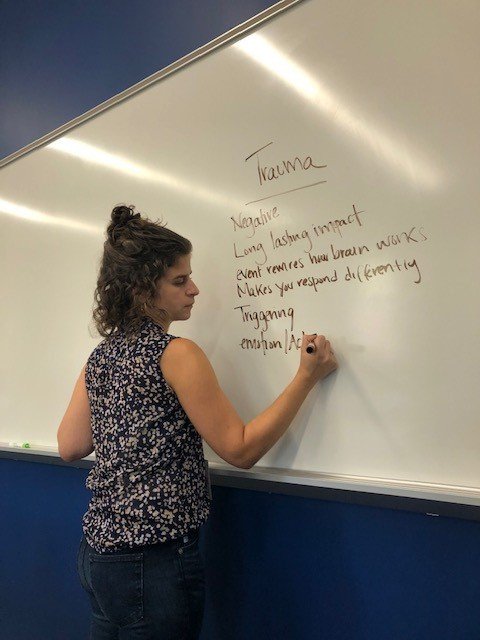This Teen Dating Violence (TDV) Awareness Month, we’re moving beyond raising awareness. TDV happens in all communities, to and by people of all genders and sexual orientations, and in all forms (verbal/ emotional, sexual, physical, cultural/ identity/ spiritual, financial, cyber). In the field of violence prevention, it’s widely known that around 1 in 3 teens experience some form of physical, verbal/ emotional, or sexual abuse from a dating or romantic partner.
Clearly, TDV is happening. This school year, we’ve noticed an increase in the number of disclosures from students Often this isn’t because more abuse is happening, but because young people now have the words for what they’re experiencing or have experienced, or because they feel like now they have a space where they can share their story. These disclosures tend to happen at the end of a workshop series when I’m packing up to leave for the day. Sometimes they happen during class, either through a direct disclosure or an indirect question. Often, the young person is reaching out for resources, guidance, and support. We’re typically only in schools for 2-4 sessions per class, so we’re sometimes left with the feeling well, I’m about to finish teaching at this school for the year, so what happens now?
When discussing this concern with my colleague, Jessica Teperow, Director of Prevention Programs, she said “Molly, we’re not there all the time- and we can’t be. But what we can do is serve as connectors. We can connect youth to local resources, supports, and people who they can access daily.”
From there, we asked these questions: what are the systems and supports that would help a teen feel supported and thrive? What are some unique barriers and experiences teens may have? How can we help build systems and trust within a school community? We feel the need to foster and support consistent responses and also tailor systems to the unique strengths and challenges of each community. Our goal isn’t to be the only one supporting these young people. Our goal is to help develop, train, and sustain systems, communities, and individuals so these young people will always be supported by caring and trauma-informed adults.
So, how can we do this? First, we work to incorporate teachers into the classes we teach, creating options for co-teaching. Doing this engages the teacher (who sees their students every day) in the conversation, modeling that they are a trusted adult who values these topics and with whom they now have a shared dialogue and experience. We also have been increasingly connecting with guidance counselors before, during, or after classes, and even have them come in and participate in the workshops. This creates a more seamless link between students, teachers, guidance counselors, and the ability to access additional supports.

Yet this doesn’t happen without preparation. Building community capacity to support young people requires training so that educators, family members, and other adults can build their confidence and competence to take on this prevention work. Lately, we’ve been training school staff and faculty on strategies to create trauma informed classrooms and schools. As we do these trainings, we understand the need to spend more time on skills such as responding to disclosures, accessing resources, and identifying barriers and warning signs of TDV.
In my conversations with students, teens often share their hesitance to tell adults about their experiences because they are afraid the adult will tell other adults, who will then act differently around them. They’re unsure which resources are for them or how to access them. They ask questions like “who is the hotline for? Is the hotline for friends and family?” “What happens if parents are in an abusive relationship and there are kids at home?” “How does this work?” “What are my options?” These young people are searching for trauma-informed systems of support and for people who will listen to and believe them.

From what I’ve learned from the teens I work with, deeply listening to the young people in our lives is a profound act of empathy. Holding someone accountable- whether that is a teen, a colleague, a friend, a family member, ourselves, a community, or a system- is an act of love. This Teen Dating Violence Awareness Month, let’s go beyond raising awareness. Let’s work together to build skills and systems that can help teens feel heard and supported, and through that, help them thrive.
To find out how to bring REACH in for a teacher, staff, or parent training on how to support the young people in your life, contact Jessica Teperow at Jessica@reachma.org.





